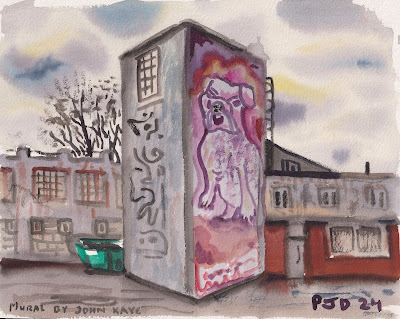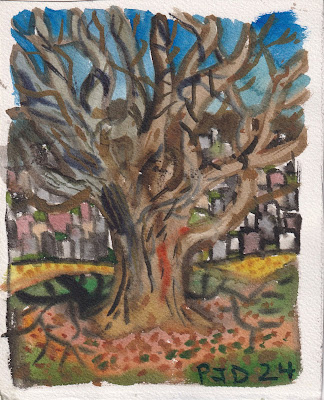After painting another dépanneur in Point st Charles I turned to see this incredible view down the street. Its the corner of Charlevoix and Knox, looking west along Knox. I liked the way the trees on the left were reaching up towards the sun, and how the classic architecture reflected the sunbeams on their bricks. Painting into the sun is never advisable, I had polarized sunglasses on, and my bike visor blocked the sun, which was much higher in the sky in real life. There were a few more scenes around here I might like to do if it ever snows, as you can see in the painting it was just like spring today.
Sunshine over Point st Charles, watercolour 6 x 7.5" cold press, November 2024 (No. 4151)
Here is the dépanneur painting it is a Provi-Soir brand, with an interesting facade. The red brick building in the background is typical for the area. Holding together the composition is a prominent tree sweeping upwards. Sometimes I use yellow ochre to over-paint the tree branches on the sky, which works reasonably well even if it breaks a few watercolour 'rules'. I wrote a blog about it once, where I broke all the rules possible to make a painting, and then waited for the watercolour police to show up, but that never happened.
Beau-Soir Provi-Soir on Charlevoix, watercolour 6 x 7.5" cold press, November 2024 (No. 4152a)
Part of the old train yard has been bought by the city and they are developing it into a community project, a kind of hipster haven perhaps. This old building, probably where the engineers used to fix trains, has been converted into little shops, a community garden, and a few other projects in the works. There were a lot of people here working on the gardens, playing in a park area, and generally enjoying the space. One fellow liked my painting and said in French that he also does watercolours.
Point st Charles development, watercolour 6 x 7.5" cold press, November 2024 (No. 4153a)
Lastly, there was an old rusty train bridge that had been spray painted with black and white graffiti with green highlights. The colours and textures were incredible so I made a quick painting of it, along with some of the surrounding elements. The street going underneath is Wellington, which stretches from downtown Montreal all the way to Verdun.
Train bridge over Wellington st, watercolour 6 x 7.5" cold press, November 2024 (No. 4153b)

















































